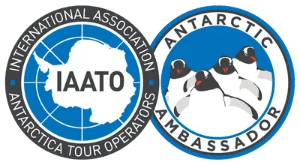Ocean Expeditions facilitates scientific expedition and rare-sighting of Type D Killer Whales off Cape Horn, Southern Chile
In January, Ocean Expeditions hosted a group of international whale research scientists onboard research vessel ‘R/V Australis’ in search of Type D Killer Whales.
The killer whales were first sighted in 1955, when they were stranded on the coast of Paraparaumu, New Zealand and there have been only a handful of sightings since.
During this time, the Scientists’ pieced together photos, tips from fishermen and a distribution map showing location sightings.
With their findings, they boarded ‘R/V Australis’ and we started the journey out into the Drake Passage where the search began.
Patiently watching and waiting, on day one of week three, the weather cleared, and we spotted the stunning animals which Bob Pitman of NOAA Southwest Fisheries Science Centre, has spent 12 years searching for.
As 30 whales swam in their natural habitat in the sub-Antarctic waters, we were able to deploy the Scientists’ hydrophone behind the vessel in an attempt to record Type-D vocalisations. The whales were silent, however underwater images were also captured from wide-angle cameras mounted on the hydrophone.
Rebecca Wellard, Research Scientist, Curtin University Australia, said: “As soon as I deployed the towed hydrophone and underwater camera setup, the killer whales came straight over and inspected it- possibly in the hope to steal some of their favoured toothfish. They were curious of the cameras and we were lucky enough to record some incredible footage, giving us some insight into their secret world under the water.”
Now back on dry-land and in the lab, the scientists will examine the DNA from three biopsy samples.
Bob Pitman said: “These samples hold the key to determining whether this form of killer whale represents a distinct species.”
Ben Wallis, Owner and Skipper, Ocean Expeditions, said: “I have known Bob Pitman for more than 10 years and am ecstatic to have collaborated with him and the group, to enable them to find this proposed new species and a professional working space onboard to document DNA samples collected.
This expedition demonstrates there is so much more to learn about our oceans and a hint that there’s still undiscovered new life. If this is what we can find on the surface, imagine all the species under the surface.
I’m excited to see the Scientists’ findings and if this sighting leads to formalising a new species. The samples collected were about the size of a pencil eraser, but the information will give us so much insight into their genetics, gender, any possible pollutants and if their diet is being effected by the fishing industry,” he said.
The research expedition attracted global media coverage, to find out more click on the links below or contact us for upcoming trips and destinations.

